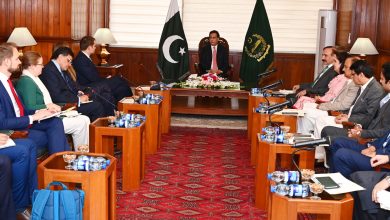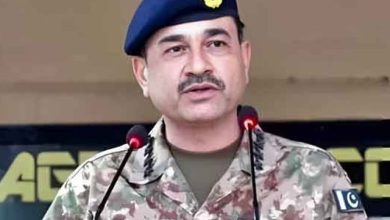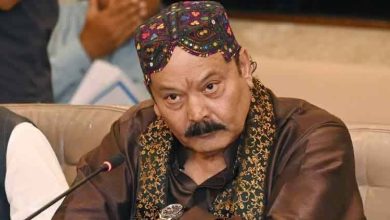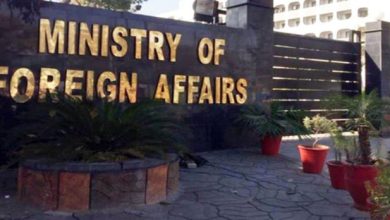Indian, Pakistani delegates clash over Kashmir, terrorism, after PM Shehbaz’s UNGA address
 United Nations: Pakistani and Indian delegates engaged in a sharp verbal duel at the United Nations, after Prime Minister Shehbaz Sharif drew the world community’s attention to India’s policy of “brutal coercion and oppression” in occupied Kashmir and the “externally financed” terrorism against Pakistan.
United Nations: Pakistani and Indian delegates engaged in a sharp verbal duel at the United Nations, after Prime Minister Shehbaz Sharif drew the world community’s attention to India’s policy of “brutal coercion and oppression” in occupied Kashmir and the “externally financed” terrorism against Pakistan.
According to Kashmir Media Service, the Indian delegate, Bhavika Mangalanandan, reacted to the Pakistan Prime Minister’s strong speech in the 79th session of the United Nations General Assembly in which he referred to New Delhi’s threats and arms build-up, warning that Pakistan will respond “most decisively” to any Indian aggression.
Ms Mangalanandan, a first secretary in the Indian Mission to the UN, claimed that Jammu and Kashmir was an internal matter of India, and accused Pakistan of cross-border terrorism. She also commented on some of Pakistan’s domestic matters.
Exercising his right of reply, Pakistani delegate Muhammad Faheem dismissed his Indian counterpart’s “false narrative”, asserting that Jammu and Kashmir is an internationally recognized disputed territory. “It has never been, nor will ever be, a part of India, nor is it an internal matter.”
The UN Security Council has unequivocally called for a free and impartial plebiscite to enable the Kashmiri people to exercise their inalienable right to self-determination, he said, adding that India was obligated to honour that decision.
“Yet, instead of honouring its obligations, India has chosen the path of repression, subjecting the legitimate aspirations of the Kashmiri people for self-determination through a brutal and oppressive occupation,” Faheem, a third secretary in the Pakistan Mission to the UN, said.
“India’s illegal and unilateral actions of 5th August 2019 further intensified this occupation, with nearly one million soldiers deployed to suppress the Kashmiris’ legitimate right.”
India’s crimes in Kashmir are “heinous and committed with impunity”, with innocent civilians targeted through staged encounters, extrajudicial killings, and collective punishment.
“Entire villages have been razed, the entire Kashmiri political leaders remain incarcerated, and a media blackout continues to stifle independent voices,” the Pakistani delegate said, pointing out that, “This is the largest military occupation in the world, where over 8 million Kashmiris live in a perpetual state of siege and terror.”
The UN High Commissioner for Human Rights and over a dozen UN Special Rapporteurs have documented these widespread violations, and called for the investigation of human rights violations in occupied Kashmir, he pointed out, noting India’s consistent denial of their access to the occupied territory.
Rejecting baseless allegations of terrorism, Faheem remarked, “It is ironic that a country, which uses terrorism as an instrument of state policy against its neighbours, should attempt to point fingers at others. India, which has been sponsoring terrorism and orchestrating assassination campaigns worldwide, is hardly in a position to lecture others on the issue.”
For decades, he said, India has been the primary perpetrator, supporter, and financier of terrorism, sponsoring outfits such as the Tehrik-i-Taliban Pakistan (TTP) and the Balochistan Liberation Army (BLA) that have claimed the lives of thousands of innocent Pakistanis.
“Pakistan has shared irrefutable evidence of India’s involvement in terrorism with the international community.”
The arrest and conviction of Kulbhushan Jadhav, a serving Indian naval officer and an operative of India’s intelligence agency RAW, is irrefutable evidence of India’s state-sponsored terrorism, including targeted assassinations in Pakistan, he said.
“Now, the Indian terrorist franchise has gone global with assassinations and attempted murders of political dissidents on North American soil.”
Referring to the events of 1971, the Pakistani delegate said those were not a question of genocide but of India’s foreign aggression and attack on the national sovereignty and territorial integrity of Pakistan. “I would like to request the Indian delegation to refer to the General Assembly resolution of December 1971 which upheld the sovereignty and territorial integrity of Pakistan against the foreign invasion.”
While the Indian delegate referred to India as the biggest democracy, he said, the world knows that India’s reign of terror against its minorities continues unabated.
“The BJP-RSS government, which has ruled India since 2014 is imposing a reign of fear and violence, not only against the people of occupied Kashmir, but also against its own Muslims, Christians, Dalits and other low caste Hindus,” Faheem said.
“Islamophobia has deeply infiltrated the Indian state, where 200 million Muslims face lynching by cow vigilantes and pogroms led by RSS, often with government complicity.”
Muslims, he added, are facing forced conversions, disenfranchisement, restrictions like the hijab ban, anti-love jihad laws, and the destruction of hundreds of mosques, including the Babri Masjid, all aimed at erasing Muslim identity and culture, which are integral parts of India’s history.
In conclusion, the Pakistani delegate called on India to end its state-sponsored terrorism, cease its illegal occupation of Jammu and Kashmir, and fulfil its obligations under international law.








